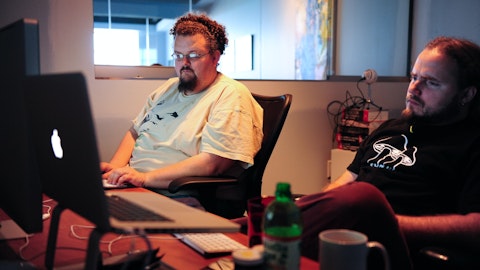Gil Shwed: I want to be — I don’t want to sound arrogant here. I think we can do so much better in Check Point, and we have so much potential with our sales force. But what we see now is completely the result of the economy. I think our sales force is performing better, is doing better on every parameter that I’m looking into. Again I can think that they can do so much more. I mean I don’t think that we are at 100% productivity. I think we can get much more productivity from our sales force, but our sales force is improving. In the last year, we hired a lot of good people actually in the last six months, the level of attrition went drastically down and so on. We did hire some new people in the second half of 2022. I think if you remember, when we went into 2022, I came in with pretty aggressive hiring targets for the sales force.
Some hired them in the first half of the year, some only got to that hiring in the second half of the year. But still I mean our sales force I think is not the source of the challenge, the source of the challenge is clearly the economy.
Gregg Moskowitz: Thanks, Gil.
Kip Meintzer: Thanks, Gregg. Next up is Shebly Seyrafi followed by Dan Ives from Wedbush.
Shebly Seyrafi: Thank you. Any vertical callouts, especially in the financial services vertical and the technology vertical?
Gil Shwed: No, I think the trends in the marketplace are very universal. We had some challenges in the financial sector. We had some big wins in the financial sectors. Same with the technology sector, which is the financial sector is maybe our largest sector. And again, I think that’s what we’ve seen in terms of the trends in the marketplace are pretty universal, I must say. Roei, anything you want to add to that?
Roei Golan: Not in specific vector or industry vertical or industry. I mean we’ve seen broadly enabled. I mean, in everything, not specifically, we didn’t see it in finance or something other — or some other industries.
Shebly Seyrafi: Okay. Thank you.
Kip Meintzer: All right. It looks like Dan Ives is on CNBC or some other place. So we’re going to move forward with Irvin Liu, followed by Michael Turits.
Irvin Liu: Hi. Thanks for the question. Perhaps another one on macro. So I wanted to better understand the thought process behind some of our customers delaying project refreshes are some of these longer sales cycles, the result of lower-than-expected IT spending budgets broadly or if there was a specific targeting of moderating cybersecurity spending just following a few years of accelerated spend there?
Gil Shwed: From what I can say is the general trend in the industry and nothing about cyber. When I speak to people, everybody, and I’m saying everybody from CFOs, CEOs, CISOs, they all say that cyber is still a great source for investment. It’s still very much needed. When you see the attack landscape, there is definitely, you see the reasons for that. So nobody is thinking that cybersecurity spending should go down. So I believe that what I see is the general trend from friends that I have in the industry in other areas of IT, the situation in other segments is much worse actually than in cyber.
Irvin Liu: Great. Thanks for the color.
Kip Meintzer: All right. Our next caller is Michael Turits followed by Ittai Kidron, who will be our last call for the day.
Michael Turits: Hey, Gil and Roei and Kip. Just wanted to come back to the sales force growth, which I think, Gil, you just said, not significant growth. I think you’d said for this year. I think you had said double-digit growth previously. So is there a change there? Are you pulling back on your expectations? And if so, what does that mean in terms of some of the things you’re trying to achieve from a go-to-market perspective and to get that greater sales engagement you’re talking about?




